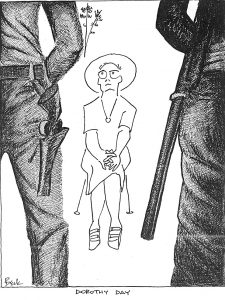The prophet repays a kindness
July 2, 2017
THIRTEENTH SUNDAY IN ORDINARY TIME
2 Kgs 4:8-11, 14-16
The prophet repays a kindness
Ps 89:2-3, 16-19
In praise of the king
Rom 6:3-4, 8-11
Baptism into death
Mt 10:37-42
The cost of discipleship
http://www.usccb.org/bible/readings/ 070217.cfm
[ms-protect-content id=”1339,323,1059,1325,324,257,322,6459″]
 Matthew concludes his mission discourse in Chapter 10 with two admonitions. The first articulates the cost of discipleship in classic fashion, calling for the disciples to place commitment to the task over family ties and even one’s own life. Discipleship makes demands, and those who would be disciples must be aware of that.
Matthew concludes his mission discourse in Chapter 10 with two admonitions. The first articulates the cost of discipleship in classic fashion, calling for the disciples to place commitment to the task over family ties and even one’s own life. Discipleship makes demands, and those who would be disciples must be aware of that.
In his letter to the Romans, Paul puts this in the context of baptism, as a seal of that commitment. Paul has a particularly vigorous sense of the community of the baptized as the body of Christ. Those who are baptized are baptized into the death of Christ. But because of this, they also participate in the new life of resurrection.
The second part of Matthew’s message today concerns the need to come to the assistance of those who are experiencing that cost of discipleship. “Whoever receives you receives me, and whoever receives me receives the one who sent me.”
Then, in parallel statements, the passage aligns the figure of Jesus with two more: the prophet and the just (or righteous) one. “Whoever receives a prophet because he is a prophet, will receive a prophet’s reward.” And the same holds with the just person. The implied equivalences present Jesus as prophetic and just. Meanwhile, those who champion justice are prophetic and like Jesus.
Giving attention to those who assist the prophet as receiving due reward highlights an aspect of the prophetic vocation of the church. The prophet confronts injustices in society. Not infrequently this comes at a cost—the cost highlighted in the readings for today.
However, not everyone is called to be on the front line of resistance. That can be a lonely and high risk calling. While all are enjoined to resist injustice, risking personal safety or reputation to take a stand against social evils is not the charism of everyone in the community of disciples. That is where the prophetic community comes in—what I sometimes think of as “the care and feeding of prophets.”
Some faith-based prophetic communities, like Jonah House in Baltimore, or many Catholic Worker communities, devote themselves specifically to social witness. Yet not everyone in those communities are involved in taking the big risks. Some are needed maintain the house, do the cooking and cleaning, and keep the community viable so others can stand at the line.
This can be expanded to other situations. Volunteers may devote a day or some other scheduled time to help at shelters or soup kitchens or similar efforts. Some support missions or causes and lobbying groups with financial donations. This too is being part of the prophetic community.
The prophetic implications of the readings are dramatized in the first reading. The prophet Elisha has experienced unexpected hospitality from “a woman of influence” in the town of Shunem, located in the northern part of Israel where Jesus will later mount his own mission. She noticed that the prophet regularly visited the area and proposed to her husband that they set up a place for him to stay when he was in the neighborhood. “Let us arrange a little room on the roof and furnish it for him with a bed, table, chair, and lamp, so that when he comes to us he can stay there” (2 Kings 4:10).
As if acting out the sayings in the Gospel, Elisha and his servant Gehazi are puzzling about how to reward her. Elisha, who is pictured with special influence with the God of Israel, uses his connections to reward her with something she has long wanted but was unable to enjoy having. Before the year is out, she and her husband will have a son.
For reflection: What are some other ways in which the discipleship community can provide for the care and feeding of prophets?
Father Beck is professor emeritus of religious studies at Loras College, Dubuque.
[/ms-protect-content]
[ms-membership-login]




